When I woke up, it was past 10am to the noise of too-eager children riding their scooters in circles. I washed my face, made coffee, smoked a cigarette and read Blue Highways until I needed to defecate.
Using the resistance bands, I worked out for the first time since Shenandoah, then repeated my dinner with the already fried Spam and Becky’s tomato—I learned the woman from the Ironton farmer’s market’s name from the label on the dandelion-violet jelly, which had the day before made a nice post-cigarette sweet snack.
I packed methodically, poured hot water over two bags of chamomile tea in a canteen, refilled the water jug, disposed of the trash, loaded up the charging solar battery, and washed my face.
With the lack of sunscreen serving as a clock, I spent the afternoon at the river, alternating between reading “Smoke and Summer” and floating down the 150 foot stretch of light current, tip-toeing back up to read again. When my skin began to burn, I waded ankle deep into the Little Blue’s drift and said a parting prayer, palms open. I drove on.
Taking 62, I went first to Carefree, hoping to find a reason for its name. Finding only a desolate shipping facility and a dead end, I took the name at face value and continued on.
The way wound a while until flattening onto the Ohio River floodplains and bringing me to Tell City, another sundowning town with as many or more storefronts hollow and abandoned as ones occupied. Still, everything that was was like everything that wasn’t: closed. In towns like this, one of the few remaining businesses always seems to be a signage store, as if the mere prospect of announcing a venture was sufficient to do the whole thing in—though perhaps such things are as much or more a testament to hope as they are to failure; Tell City’s was called Logos.
Ancient rusting pumps sat outside an old service station filled with decades-old furniture that in another zip code would attract prices high enough to demand their salvaging. Across the street, a 19th Century bank, now a ‘saloon.’ High above it all—if ‘all’ it could be called—and ringing with the direct rays of a descending sun, the modernly round and freshly fire engine red water tower, almost bending over the town with surreal stature. What was left of Tell City but the telling alone? I drove on.



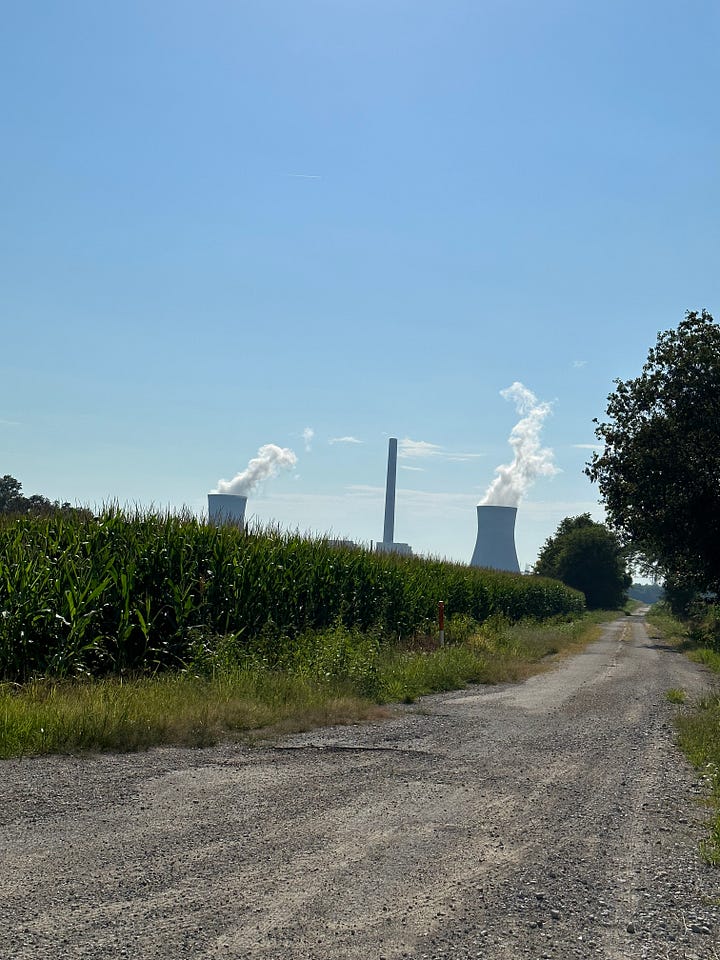
A big-shoulder highway passed into Rockport, the same sort of buildings belonging to similarly decaying aspiration, albeit a town more lively than the previous. It was 94 degrees when I reached Newburgh; “extreme temperature warning until 10pm” read my phone. Boiling in the van without AC, I pulled an icy Gatorade from the cooler behind the center console and chugged it as I drove down Main Street. Evansville might have been a bigger place, but I couldn’t find it; whatever downtown, whatever history, it had, it was not so close to the river.
Silver Mines, Missouri serving as a waypoint, I found myself crossing yet another steel bridge into Kentucky, a better one with fewer fences, albeit the same foul rivers. Photographs presented themselves, or perhaps my attitude opened to them: old cars, barns, a pair of industrial smokestacks foregrounded by endless cornfield. The air refused to cool, and I drove on.
Northwest through Corydon and Morganfield and over a bridge similar in disrepair to the one in Evansville. A forgotten town to the right and off the first exit, a road so long ago paved that it was unlined and pepper-white. I was in Old Shawneetown.
At the edge of small open field, a short orange trailer read SEXCO: an omen. A left turn revealed the monolith of a columnated bank—Illinois’s first, built in 1839 in the Greek Revival style—one of the few buildings to survive the floods and fire that ended Old Shawnee. Two bars stood across the street, one boarded up and once called Hogdaddy’s, the other open and named Layton’s; a few trucks parked out front.
At the edge of the crumbling city block, I wondered if I should stay, deciding with a coin toss: heads for leave, tails for stay. Heads. But I need more convincing to go deny my impulse—two out of three. Tails, then heads again. I drove on. Less than ten miles later, and seeing the state of the “new” Shawneetown, I turned around.
Next to the open bar and at the back of a grass-covered empty lot, was a marker informing any sufficiently curious member of the public of the significance of May 7th, 1825, the day on which the Marquis de Lafayette stopped in Shawneetown during his trip up the Ohio River on his tour of the then 24 American states. I took the information as a fortuitous sign that I had made the right choice, ignoring the bit about the sinking of his steamboat, the Mechanic, just miles away the following day.
Layton’s Old Town Bar & Grille has, rather quixotically given its subprime location, a tagline: “Come join us, none of our pieces fit.” At some point, in an effort to reinforce the cleverness of this bit of advertising, someone had sporadically painted jigsaw puzzle pieces in primary colors on the walls throughout the bar, which itself consisted of several aesthetically disjointed extensions of widely varying construction materials. Of course, the theme of Layton’s is really the people, and the tagline, at least for me, could have functioned as prophecy.
Drunkenly congenial or becoming so, a guy who introduced himself as Sailor Boat—“but everybody just calls me Boat”—was the first to say hello. He wore a motorcycle brand cap over metal-rimmed glasses and a grey-blonde ponytail behind a long face and over a wiry frame. He was a ready-to-print character, the archetype of a wily sidekick, the kind to be held both amiably and in suspicion.
Apart from the blue collar guys who belonged to some of the bigger trucks outside, the crowd—about ten or twelve in number—were all bikers or biker-affiliated. I ordered a beer, then another with a cheeseburger and fries. I smoked a cigarette, came back in and ate; the burger was the kind you get at a small town football game, charbroiled frozen and grey but good. I ordered another beer and took it out the side door where several picnic tables occupied what must have once been an adjoining building but of which only the roof remained. Gravel, string lights and small stage suggested the space functioned at other times as a live music venue.
As I sat smoking, Boat and a woman came out and sat down at the table across. “Hey, you want some pot,” Boat yelled. I looked over, interested. “You’re either joining or you’re leaving,” spoke the woman with dark, false-brown hair, quite drunk. “Well, I guess I’m joining,” I said. Boat laughed.
This is when he introduced himself. “‘Cause I was in the Navy. Caught the last year of Vietnam, but I was mostly delivering ammunition. Luckily didn’t have to shoot nobody.” He lived not far, in New Haven, in a riverboat community. “We drink tons of beer over there all the time man,” he sung with the drug-rhythm of the 70s.

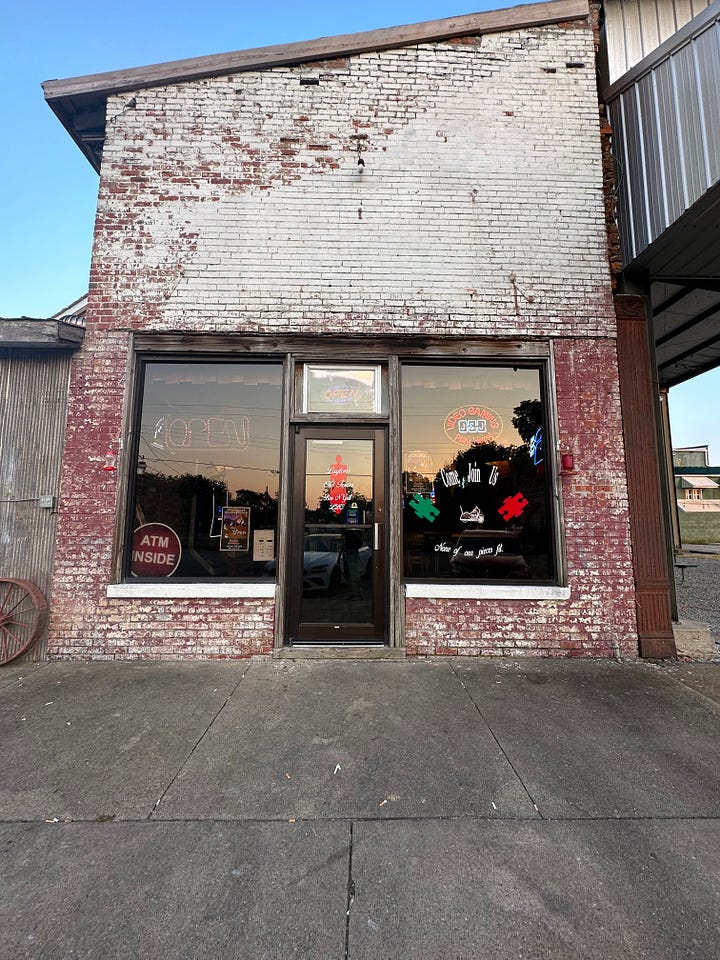
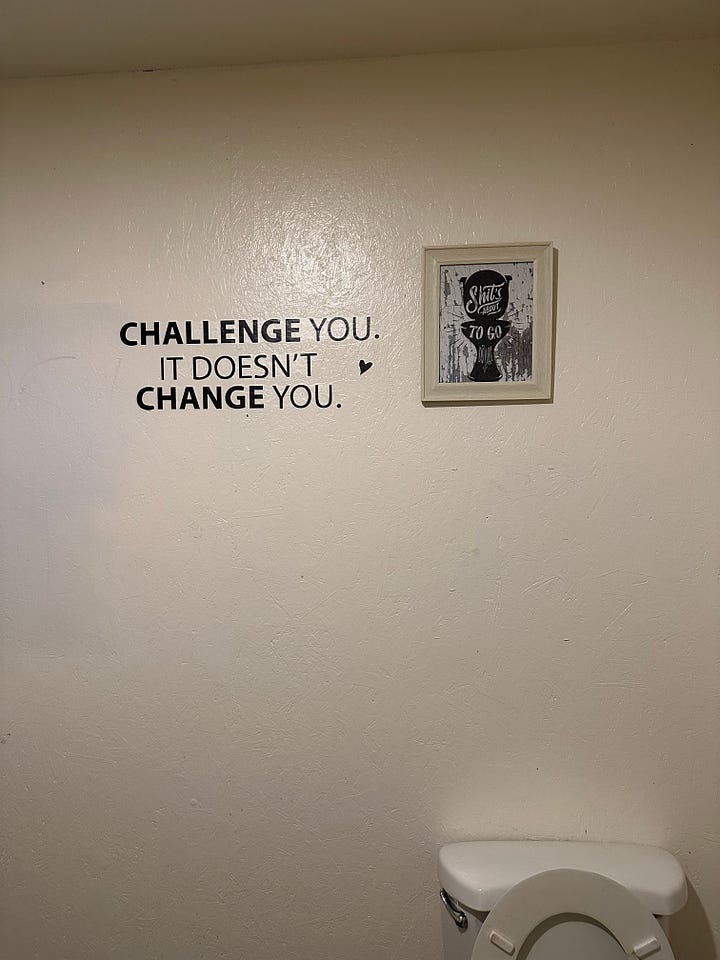
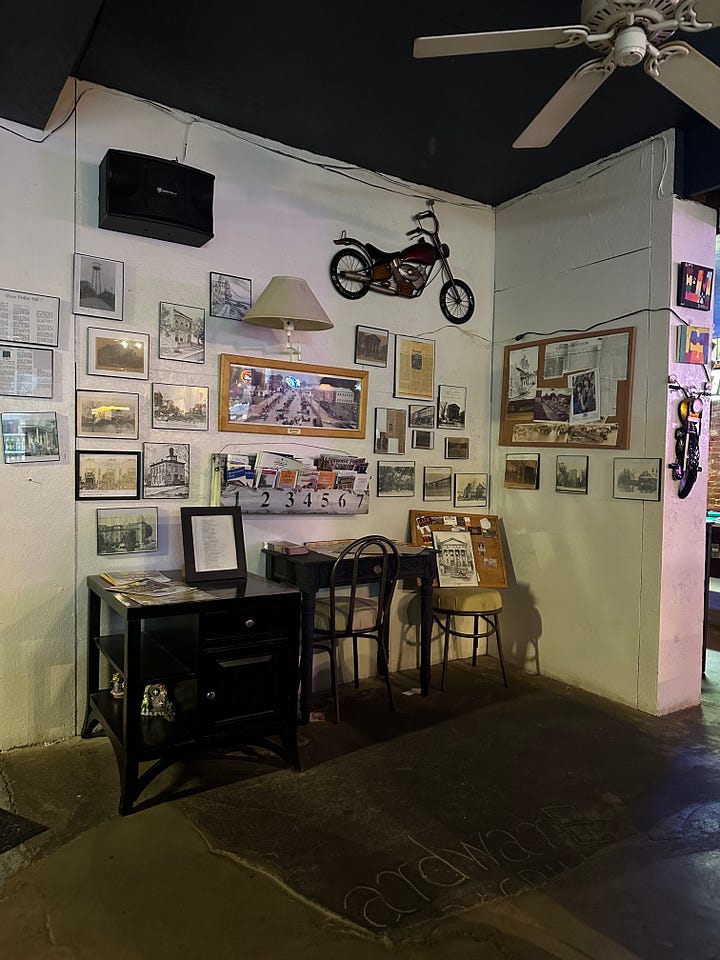
They talked amongst themselves for a while as Susan packed and passed fresh one-hitters. She’d been married last November, and Boat was remarking how good a match she and her new husband, Russell, were making. “I’m his, and he’s mine,” she said. “And nobody messes with him”—he’d been good to her.
“‘Cause you love to ride, and he loves to ride,” said Boat. Not a long list but an important one.
“It can get dangerous with him,” Susan then admitted. Russell was a Storm Rider, like his father Danny before him, and a felon. “But it don’t need to be,” Susan added, affecting her love with drawn lips and soft eyes.
“And look at those purrrdy nails,” exclaimed Boat about Susan’s inch-and-a-half, Harley flame-painted “breaks,” as she called them. “I’m good at 100, but if he gets up to 105, I put these on his neck,” she said, clawing the air. Boat and I laughed.
“But nobody messes with me,” she repeated, more to the stranger at the table. “I’ve got weed and a 357 in my purse.” Turning to her bag, Boat and I held our breath; we were both relieved, Boat more audibly than I, to see her remove only her phone.
She brought up a picture of her gun collection, at least a dozen rifles and pistols nearly laid out on the pink floral comforter of a queen size bed that was almost too small to allow space between weapons. “I love guns,” she said, not letting the picture speak for itself. “But I’ve gotta hide all my shit ‘cause he’s a felon,” she added, referring to Russel, and reiterating that neither her nor her husband were to be messed with; Susan was in somewhat of a defiant, circular mood.
“Your dad was soo cool,” said Boat, moving on and as if he were much younger. It was clear he looked up to Russell—they rode motorcycles and crotch rockets, anything they could find, when they were younger—and they had both looked up to Danny, who’d been popular among their ilk. When he died, a banner was signed by the many members of his biker family at his funeral. “I still got it,” said Susan. “It’s hanging on the wall in our spare bedroom.”
Finally, in the reminiscent silence, I asked, “So where am I?”
“NEW-HA-VEN,” Boat almost yelled, then—corrected by Susan—“Shit! I don’t even know where I am.”

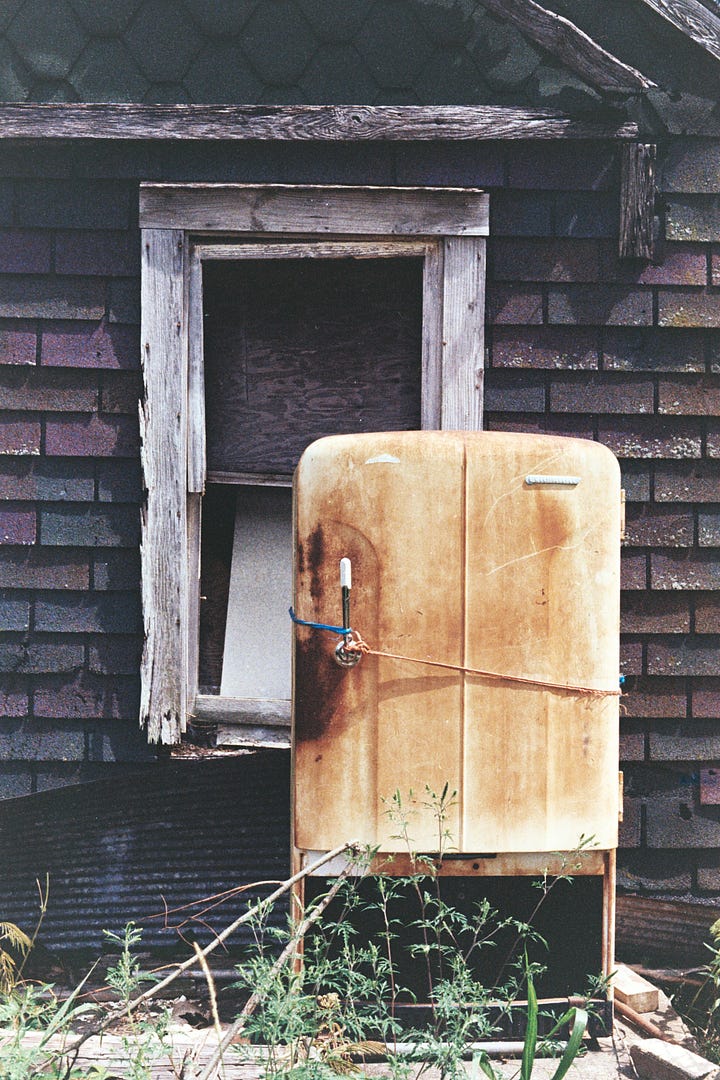
Boat told us a story of Russell getting into a fight with someone in another town. The other guy had a toupee, and when Russell hit him, it flew up, exposing his bald head. “I was laaaughin’ and the sum bitch got mad at me. Forgot all about Russell!”
The devil came out to check on Susan, and Boat informed him of his retelling. Russell, tall, round, gruff and grey-bearded, added detail; there’d been a .45 involved, as well as a local cop who’d written him and everyone in his family speeding tickets. At a certain point, he said the n-word and went back inside with Susan. Boat went in, and then I did too.
Back inside, Russell and Susan had vanished, and in their place a freshly arrived regular; as he was Black, I thought it odd timing.
I moved over to the other side of the bar, hoping for something more to happen, for someone to ask the where you from I’d come to expect in such small places. Nobody did—just a few how ya doin’s and a you can’t win in response to one of the former. Imagining violence, drugs, money or all three from the moment Susan showed me her guns, I started lowering my expectations that Layton’s and its Old Shawneetown misfits had much to offer on a Sunday night.
The drunk woman who’d been playing pool kept playing pool, as if she had been getting drunk and playing pool since she was sixteen, as if she never even had to get drunk or pick up a cue stick. To the annoyance of those nearer to her, these were simply her default settings.
Without another word, Boat, who’d already exclaimed somewhat prematurely, “Great partyin’ with ya,” left, as did several others. Taking my own leave, I walked past the Black guy. “Be safe buddy,” he said; I nodded in response. Outside, I wrote the day.
But the night wasn’t quite through. Stumbling her exit, the drunk, pool playing woman took a perilous step towards my car and said “hi.” She sat a while in her own car, parked next to mine, but then crept around the back of the van to my open window, startling me. “What can I do for ya,” I asked.
“When was the last time you had a cunt hole,” she garbled. “A while,” I said, letting her know with my expression that I was very much willing to let it be a while longer.
“We gotta do what we gotta do to survive,” she assured, giving me a high five and stumbling away. She drove off, surprisingly straight, and I drove on. Past two does, ears shining like oyster shells, past what might have been a badger, past miles of flat fields of corn and shadow, through the quaint downtowns of Harrisburg and Marion, and finally, to Carbondale, where I slid into a sloped parking spot near a large church, crawled into the back of the van, pissed, and fell asleep.





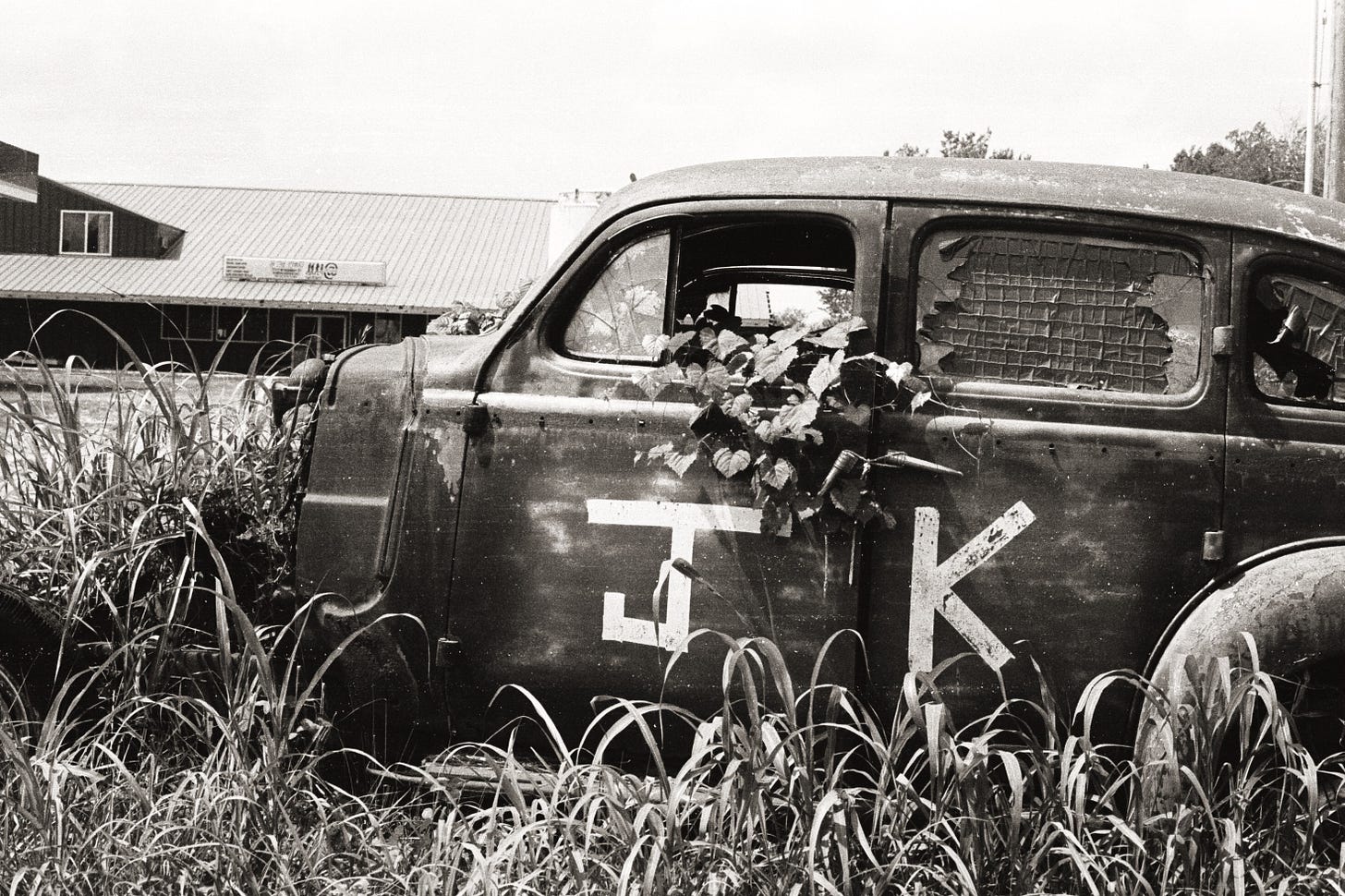

Sam- I love the serendipity of your journey about Shawneetown and even the coin flip. I must try to coin flip more decisions and see where they lead me.